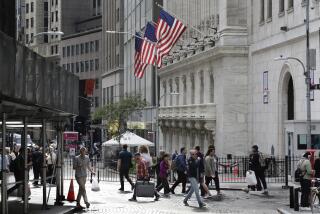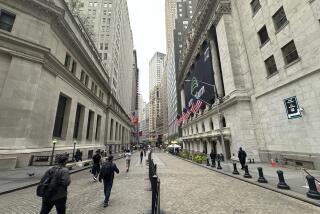Panic Selling Slows, Dow Closes Off 5.70 : Wall St.: Market seesaws as traders react to news on the Mideast. But pessimistic buyers fail to flock back.
NEW YORK — Stocks mostly moved lower in heavy and choppy activity today as traders reacted to Middle East developments.
The Dow Jones average of 30 industrials fell 5.70 to 2,710.64.
Declining issues outnumbered advances by about 8 to 7 on the New York Stock Exchange, with 735 up, 838 down and 451 unchanged.
Big Board volume totaled 231.58 million shares, against 240.40 million in the previous session.
The NYSE’s composite index added 0.13 to 183.45.
At the American Stock Exchange, the market value index sagged 0.43 to 339.84.
The panicky selling wave that engulfed Wall Street Monday, producing the worst performance since the “mini-crash” last October, subsided.
But buyers failed to flock back to the market as pessmism prevailed in the face of an ailing economy, a rising inflation threat and the Middle East crisis.
Developments unfolding in the Mideast made the stock market reverse course several times. Traders appeared to pounce on each piece of news regarding the Iraq-Kuwait conflict.
Word from the State Department in Washington that Iraq was increasing its troop readiness on the Kuwaiti border with Saudi Arabia increased the edginess in financial markets. A rumor, later denied, that Iraq had invaded Saudi Arabia temporarily incited heavy selling.
The White House refused to comment on a report that the United States was beginning a major troop deployment in Saudi Arabia.
Oil and related stocks were particularly sensitive to fluctuations in petroleum futures. On the New York Mercantile Exchange, the benchmark grade of U.S. crude settled at $28.31 a barrel, up 26 cents.
For the most part, foreign stock markets steadied, which helped restore calm in the United States.
The London stock market staged a partial rebound and the Financial Times-Stock Exchange 100-share index rose 15.6 points, or 0.7%, to 2,235.8.
But in oil-dependent Japan, stocks continued to suffer. The 225-share Nikkei Stock Average dropped 946.46 points, or 3.31%, to close at 27,653.07.
Blue chip stocks, which posted gains for most of the morning, abruptly reversed course and tumbled shortly before midday. Later, the Dow Jones average of 30 industrial stocks bobbed up and down but never managed to move back into the plus column.
U.S. Treasury bonds rebounded today following their biggest sell-off in nearly three years, one which stemmed from the rapid rise in oil prices and renewed inflation fears.
Buyers are also attracted to bargain prices on bonds, she said.
The price of the Treasury’s bellwether 30-year bond, for instance, fell more than 2 1/2 points, or $25 per $1,000 face amount, on Monday.
By midday today, it was up around 5/8 point, or $6.25. Its yield, which moves inversely to the price, eased to 8.74% from 8.80% Monday.
Monday’s rout was described as the biggest since just before the October, 1987, stock market crash, according to market observers.
More to Read
Inside the business of entertainment
The Wide Shot brings you news, analysis and insights on everything from streaming wars to production — and what it all means for the future.
You may occasionally receive promotional content from the Los Angeles Times.









